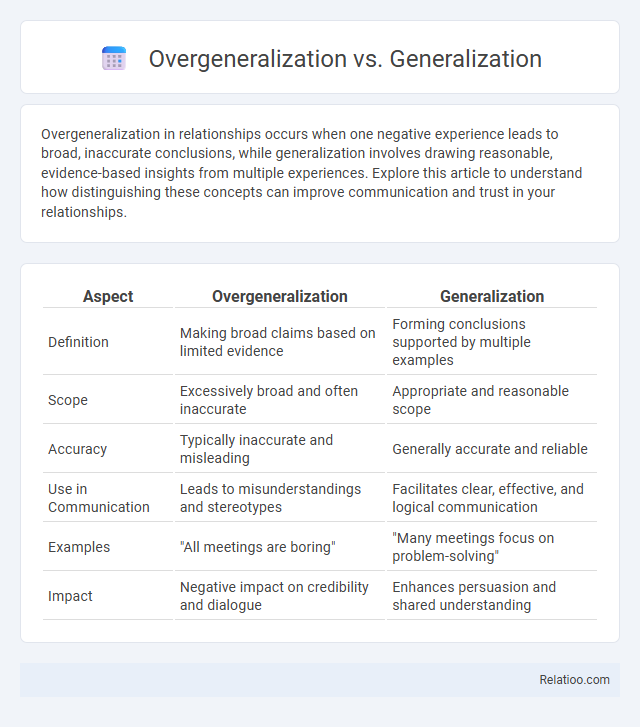Overgeneralization in relationships occurs when one negative experience leads to broad, inaccurate conclusions, while generalization involves drawing reasonable, evidence-based insights from multiple experiences. Explore this article to understand how distinguishing these concepts can improve communication and trust in your relationships.
Table of Comparison
| Aspect | Overgeneralization | Generalization |
|---|---|---|
| Definition | Making broad claims based on limited evidence | Forming conclusions supported by multiple examples |
| Scope | Excessively broad and often inaccurate | Appropriate and reasonable scope |
| Accuracy | Typically inaccurate and misleading | Generally accurate and reliable |
| Use in Communication | Leads to misunderstandings and stereotypes | Facilitates clear, effective, and logical communication |
| Examples | "All meetings are boring" | "Many meetings focus on problem-solving" |
| Impact | Negative impact on credibility and dialogue | Enhances persuasion and shared understanding |
Introduction to Generalization and Overgeneralization
Generalization is the cognitive process where Your brain identifies patterns and applies learned concepts to new situations, enhancing problem-solving and decision-making skills. Overgeneralization occurs when these patterns are applied too broadly, leading to inaccuracies or misconceptions by assuming something true in one context applies universally. Understanding the balance between generalization and overgeneralization improves critical thinking and prevents errors in judgment.
Defining Generalization
Generalization refers to the cognitive process of applying learned information or patterns from specific instances to broader categories or new situations, enabling efficient problem-solving and learning. It involves recognizing commonalities across different experiences while maintaining flexibility to adapt knowledge to varying contexts. Overgeneralization occurs when this process extends beyond appropriate boundaries, leading to inaccurate conclusions or stereotypes that disregard important exceptions or nuances.
Understanding Overgeneralization
Understanding overgeneralization involves recognizing when conclusions are drawn too broadly from limited experiences, leading to inaccurate or exaggerated beliefs. Unlike generalization, which correctly applies patterns from specific cases to broader contexts, overgeneralization distorts reality by assuming that one negative event defines all future outcomes. Your ability to identify and challenge overgeneralized thoughts is crucial for developing balanced and realistic perspectives.
Key Differences Between Generalization and Overgeneralization
Generalization involves drawing broad conclusions based on specific examples, helping you apply knowledge across similar contexts effectively. Overgeneralization occurs when conclusions are too broad or inaccurate, leading to erroneous beliefs or stereotypes that ignore exceptions and nuances. Understanding the key differences between generalization and overgeneralization is crucial for critical thinking and avoiding cognitive distortions.
Common Examples of Generalization
Generalization occurs when patterns or rules are applied broadly based on observed data, such as a child calling all four-legged animals "dog." Overgeneralization extends this by applying rules too broadly, like using "goed" instead of "went" in language learning. Common examples of generalization include assuming all fruits are sweet or all dogs are friendly, demonstrating how people form broad categories from limited experiences.
Common Examples of Overgeneralization
Overgeneralization occurs when You apply a rule too broadly, such as children saying "goed" instead of "went," incorrectly extending the past tense rule. Generalization, in contrast, is the correct application of learned rules to new but similar situations, like understanding that "dogs" is the plural of "dog." Common examples of overgeneralization include using "mouses" instead of "mice" or "goed" for "went," highlighting how language learners extend grammatical rules beyond their proper scope.
Cognitive Impact of Overgeneralization
Overgeneralization occurs when Your mind applies a single negative experience broadly, leading to distorted thinking patterns that can reinforce anxiety and depression. This cognitive distortion causes difficulty in distinguishing specific incidents from generalized beliefs, impairing decision-making and emotional resilience. Understanding the difference between generalization, which aids learning by recognizing patterns, and overgeneralization, which triggers maladaptive thought processes, is crucial for mental well-being.
The Role of Generalization in Learning
Generalization in learning enables individuals to apply knowledge from specific instances to broader contexts, enhancing cognitive flexibility and problem-solving skills. Overgeneralization, however, occurs when learners apply a rule or pattern too broadly, leading to errors and misconceptions. Distinguishing between effective generalization and overgeneralization is crucial for developing accurate and adaptable understanding in educational settings.
Avoiding the Pitfalls of Overgeneralization
Overgeneralization occurs when you apply a single experience or piece of information too broadly, leading to inaccurate conclusions that ignore nuance and variability. Generalization, by contrast, involves identifying patterns or trends that are supported by substantial evidence and allow for exceptions, enhancing understanding without oversimplification. Avoiding the pitfalls of overgeneralization requires critical evaluation of data, acknowledgment of outliers, and careful differentiation between valid generalizations and misleading stereotypes.
Conclusion: Striking a Balance
Striking a balance between overgeneralization and generalization is crucial for accurate decision-making and effective communication. Overgeneralization leads to misleading conclusions by applying specific instances too broadly, while thoughtful generalization leverages patterns to enhance understanding without sacrificing nuance. Your ability to discern this balance ensures clearer insights and more reliable judgments.

Infographic: Overgeneralization vs Generalization
 relatioo.com
relatioo.com